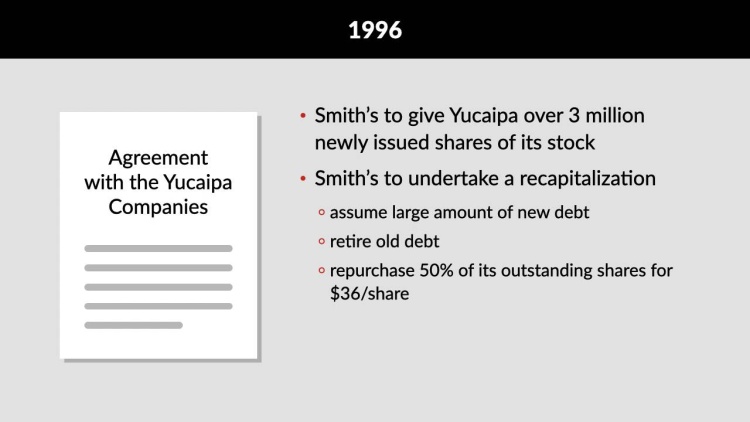Klang v. Smith’s Food & Drug Centers, Inc.
Delaware Supreme Court
702 A.2d 150 (1997)
- Written by John Caddell, JD
Facts
In January 1996, Smith’s Food & Drug Centers, Inc. (SFD) (defendant) entered into a complex merger-and-share-repurchase agreement with another supermarket company. Prior to granting final approval of the agreement, SFD’s board retained an investment firm to issue an opinion on the impact the agreement would have on SFD’s solvency. The firm found that the agreement would not endanger the company’s solvency. Specifically, it calculated that after the agreement, SFD’s “Total Invested Capital” would be $1.8 billion, while its long-term debt would be only $1.46 billion. The $346 million difference was far greater than the outstanding par value of SFD’s stock. These figures were based on a revaluation of corporate assets and differed from SFD’s balance sheets. Based on this opinion, the board and later the shareholders voted to approve the merger-and-repurchase agreement. Shortly after the transaction, SFD released a balance sheet that showed a negative net worth. The board also passed a resolution stating that SFD’s total liabilities were no more than $1.46 billion. This figure erroneously did not include current liabilities totaling $372 million. In the investment firm’s report, current liabilities were factored into the determination of “Total Invested Capital." Klang (plaintiff) brought a class-action lawsuit, purportedly on behalf of the holders of SFD common stock. He alleged that the transaction violated Delaware General Corporation Law (DGCL) § 160 because it caused an impairment of capital. Specifically, Klang argued that SFD’s balance sheets were conclusive evidence of impairment, and further that their off-balance-sheet calculations were done improperly. The trial court found in favor of SFD. Klang appealed.
Rule of Law
Issue
Holding and Reasoning (Veasey, C. J.)
What to do next…
Here's why 910,000 law students have relied on our case briefs:
- Written by law professors and practitioners, not other law students. 47,100 briefs, keyed to 997 casebooks. Top-notch customer support.
- The right amount of information, includes the facts, issues, rule of law, holding and reasoning, and any concurrences and dissents.
- Access in your classes, works on your mobile and tablet. Massive library of related video lessons and high quality multiple-choice questions.
- Easy to use, uniform format for every case brief. Written in plain English, not in legalese. Our briefs summarize and simplify; they don’t just repeat the court’s language.





